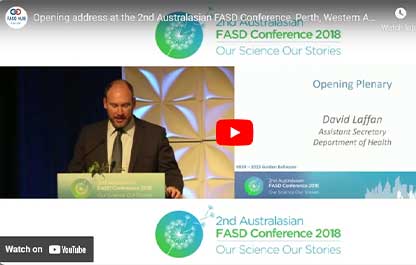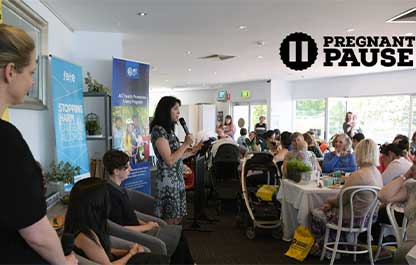
National FASD Strategic Action Plan
The National FASD Strategic Action Plan 2018 – 2028 has been developed to provide a clear pathway of priorities and opportunities to improve the prevention, diagnosis, support and management of FASD in Australia. This was launched by the Minister for Health, the Hon Greg Hunt at the second Australasian FASD Conference in Perth in November 2018.
Three-year implementation review
The FASD Strategic Action Plan 2018-2028 – Three-year implementation review has since been published in June 2023. The review’s aim is to inform the Australian Government if the plan is on-track to achieving its goals.

The Hon Greg Hunt and Mr David Laffan

NHMRC FASD Research Australia Centre of Research Excellence
Pregnancy warning labels on packaged alcoholic beverages
The Australian and New Zealand Ministerial Forum on Food Regulation agreed that “a mandatory labelling standard for pregnancy warning labels on packaged alcoholic beverages should be developed and should include a pictogram and relevant warning statement.” The Food Standards Australia and New Zealand (FSANZ) developed these pregnancy warning labels.
- Businesses have until 31 July 2023 to comply with pregnancy warning labelling requirements for all alcoholic beverages
- Businesses have until 1 February 2024 to comply with pregnancy warning labelling for post-printed corrugated cardboard outer packaging, containing more than one individual
- unit of an alcoholic beverage
Must be displayed on a prescribed alcoholic beverage with a volume over 200ml
Must be displayed on a prescribed alcoholic beverage with a volume not over 200ml
Optional alternative pregnancy warning mark can only be used for post-printed (flexographic) corrugated cardboard outer packaging that includes more than one individual unit
National Alcohol Strategy 2019 – 2028
The National Alcohol Strategy 2019 – 2028 is a framework to prevent and reduce alcohol-related harm. It highlights possible actions at the local, state or territory and national levels.
This National Strategy:
- Outlines Australia’s agreed approach to prevent and reduce alcohol-related harm
- Highlights priorities and opportunities for action
- Supports government and non-government sectors to work together
- Aims to reduce harmful alcohol drinking by 10%
State and Territory FASD policies
Northern Territory
In December 2018, the Northern Territory Government released a whole of government strategy titled Addressing Fetal Alcohol Spectrum Disorder (FASD) in the Northern Territory 2018 – 2024.
Foundation for Alcohol Research and Education
The Foundation for Alcohol Research and Education (FARE) is an independent, not-for-profit organisation working to stop the harm caused by alcohol. FARE has developed policies related to FASD.
The National Awareness Campaign for Pregnancy and Breastfeeding Women’s campaign, Every Moment Matters, is funded through the Strategic Action Plan and launched by FARE. It aims to promote the message that the safest choice is not consuming alcohol when trying for a baby, or when pregnant or breastfeeding. FARE has also developed the Pregnant Pause campaign, to encourage Australians to go alcohol-free during their pregnancy or the pregnancy of loved ones

National Awareness Campaign for Pregnancy and Breastfeeding
Every Moment Matters Campaign

Foundation for Alcohol Research and Education (FARE)
Pregnant Pause Campaign
Learn more about the role of NDIS in FASD
National Disability Insurance Scheme (NDIS)
The National Disability Insurance Agency (NDIA) identifies FASD as an important category of disability for consideration within the NDIS
The NDIS recognises Fetal Alcohol Spectrum Disorder under ‘Congenital conditions – cases where malformations cannot be corrected by surgery or other treatment and result in permanent impairment but with variable severity’ within:
Telethon Kids Institute Report
The NDIA contracted Telethon Kids Institute to conduct a critical review of the available published and unpublished literature relating to impairment and interventions for FASD.
A report was submitted to the NDIA in 2016.
Stay connected
Join our mailing list to hear more from the FASD Hub, including our monthly newsletters, webinar invitations, and new publications.
Acknowledgement of Country
FASD Hub Australia acknowledges Aboriginal and Torres Strait Islander peoples as the Traditional Custodians of Country throughout Australia, and we recognise their connections to land, water and community. We pay our respect to their elders past and present, and extend that respect to all Aboriginal and Torres Strait Islander peoples.
